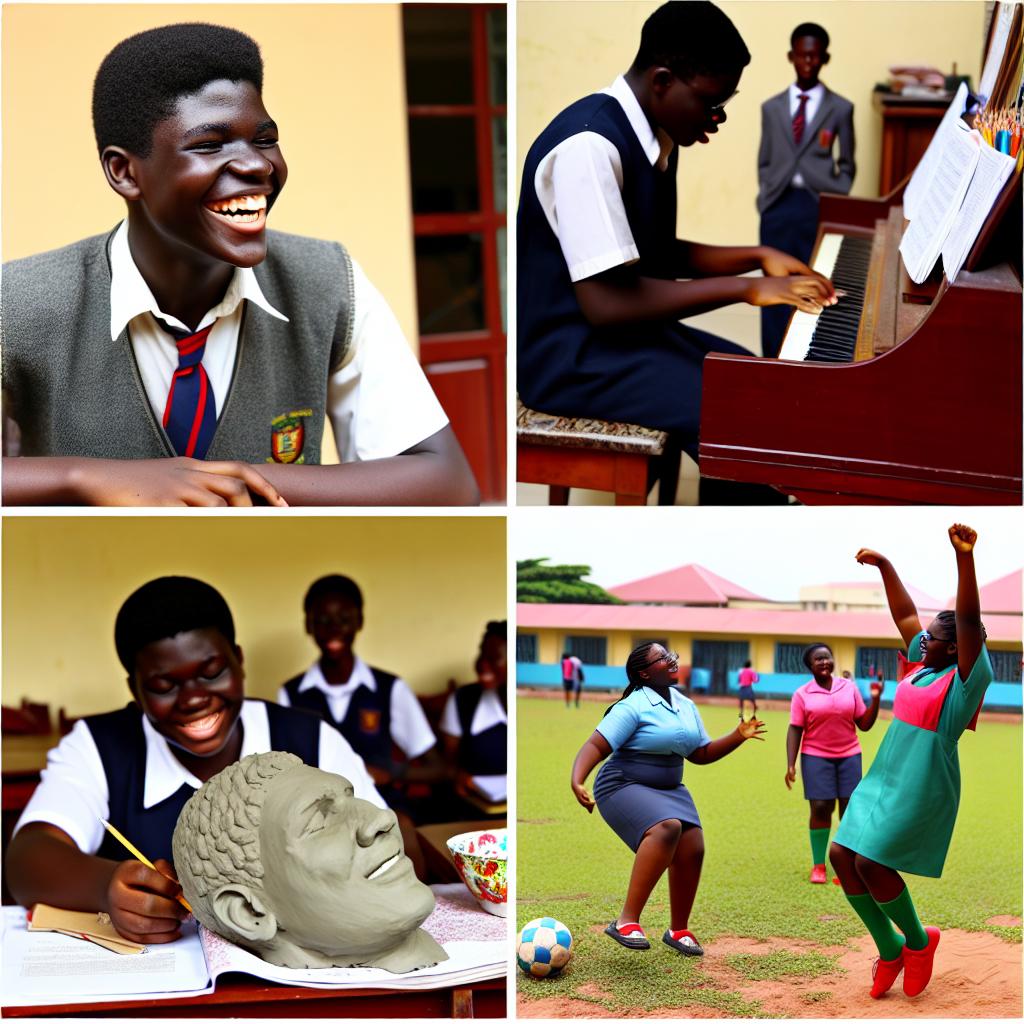Introduction to Extracurricular Activities and Their Relevance in Nigerian Education
Defining Extracurricular Activities
Extracurricular activities are programs outside the standard curriculum.
They include sports, arts, clubs, and community service.
Such activities develop skills beyond academic knowledge.
Students engage in these activities voluntarily and actively.
Importance of Extracurricular Activities in Education
Extracurricular activities support holistic development of students.
They enhance social, emotional, and physical growth.
Besides academics, they build teamwork and leadership qualities.
Moreover, they prepare students for real-world challenges effectively.
Relevance in the Nigerian Educational Context
Nigeria’s education system benefits greatly from extracurricular participation.
These activities address skill gaps often seen in classroom settings.
They also foster unity among students from diverse ethnic backgrounds.
Consequently, extracurriculars nurture patriotism and national pride in youth.
Many Nigerian schools actively promote such programs for balanced education.
Examples of Common Extracurricular Activities in Nigeria
- Sports such as football, athletics, and basketball
- Drama and cultural dance groups
- Debating and quiz clubs
- Spelling and literary competitions
- Community service and volunteer groups
Impact of Extracurricular Activities on Nigerian Students’ Development
Extracurricular activities boost students’ self-confidence and motivation.
They improve communication skills crucial for personal success.
Parenting Made Just for You
Get personalized Parenting Solutions tailored to your child’s needs. Transform your parenting journey with expert guidance in 1-3 days.
Get StartedAdditionally, these activities offer practical experience beyond textbooks.
Therefore, they play a crucial role in shaping well-rounded Nigerian graduates.
Development of Life Skills Through Participation in Extracurricular Activities
Enhancing Communication and Interpersonal Skills
Extracurricular activities provide Nigerian students many opportunities to communicate effectively.
Joining debate clubs boosts public speaking abilities and builds confidence.
Group projects in clubs enhance teamwork and interpersonal relationships.
Through consistent interaction, students learn to listen actively and express ideas clearly.
Consequently, these skills become valuable in both academic and professional settings.
Building Leadership and Responsibility
Participating in student government or club leadership roles fosters leadership qualities.
Students like Emeka Okoro develop decision-making skills through managing responsibilities.
Organizing events teaches time management and accountability.
These experiences prepare students to handle challenges in their future careers.
Furthermore, leadership roles encourage self-motivation and a proactive mindset.
Cultivating Problem-Solving and Critical Thinking
Extracurricular engagements often present practical challenges requiring creative solutions.
For instance, participating in robotics clubs encourages students to think critically and innovate.
Unveil the Perfect Name that Tells Your Family's Story
Let us help you find a name that embodies your family's values, traditions, and dreams. Our personalized consultation weaves cultural insights to create a name that's uniquely yours.
Get StartedInvolvement in environmental clubs raises awareness about complex issues and action steps.
These activities help students develop analytical skills that apply to real-world problems.
As a result, students become more adaptable and resourceful both inside and outside school.
Improving Time Management and Discipline
Balancing academics and extracurricular tasks teaches students effective time management.
Students like Amina Yusuf learn to prioritize activities and meet deadlines consistently.
Regular attendance in clubs reinforces discipline and commitment.
This balance encourages a healthy work-life routine, essential for lifelong success.
Fostering Emotional Intelligence and Resilience
Participating in team sports and arts programs helps students manage emotions healthily.
They learn empathy by working closely with diverse peers, enhancing social awareness.
Additionally, overcoming setbacks in competitions builds resilience and perseverance.
These emotional skills support better mental health and interpersonal harmony.
Key Life Skills Gained Through Extracurricular Activities
- Effective communication and active listening
- Leadership and organizational skills
- Creative problem-solving and critical thinking
- Strong time management and self-discipline
- Emotional intelligence and resilience
Therefore, extracurricular activities play an essential role in shaping well-rounded Nigerian students.
Enhancement of Social Interaction and Teamwork Among Nigerian Students
Building Strong Communication Skills
Extracurricular activities provide Nigerian students with ample opportunities to communicate effectively.
Furthermore, students learn to express their ideas clearly in group settings.
The activities create a supportive environment to practice verbal and non-verbal communication.
Consequently, participants develop confidence in speaking to diverse audiences.
Fostering Collaboration and Team Spirit
Participating in clubs and sports encourages students to work together towards shared goals.
Moreover, teamwork becomes a vital skill cultivated during such engagements.
Students discover the value of trust and cooperation through group projects and competitions.
Besides, overcoming challenges as a team enhances problem-solving abilities.
Encouraging Cultural Exchange and Inclusivity
Extracurricular programs often include students from various ethnic backgrounds in Nigeria.
This diversity promotes understanding and appreciation of different cultures.
As a result, students build friendships beyond their immediate communities.
Such social interactions nurture empathy and reduce prejudices among youths.
Developing Leadership and Responsibility
Many activities assign roles that require students to lead or organize their peers.
In doing so, they practice responsibility and decision-making skills.
In addition, leaders learn to motivate others and manage conflicts effectively.
These experiences prepare students for future community and workplace leadership.
Social Skills Enhancing Academic and Professional Growth
Social skills gained through extracurricular activities improve students’ overall academic performance.
They also enhance employability by demonstrating the ability to collaborate well with others.
Therefore, Nigerian students become well-rounded individuals ready to face societal challenges.
Ultimately, these experiences contribute positively to their personal and professional growth.
Delve into the Subject: How to Handle School-Related Stress in Nigerian Kids
Promotion of Physical Health and Well-being Through Sports and Physical Activities
Enhancing Physical Fitness Among Students
Engaging in sports helps Nigerian students build and maintain strong physical fitness.
Regular physical activity boosts cardiovascular health and improves muscle strength.
Moreover, it enhances flexibility and coordination in young learners.
Participation in team sports also encourages consistent exercise habits.
Consequently, students reduce their risk of chronic diseases later in life.
Improving Mental Health and Reducing Stress
Physical activities stimulate the release of endorphins, which improve mood.
In addition, regular sports involvement helps reduce anxiety and depression symptoms.
Students often report feeling more relaxed after participating in exercise routines.
Furthermore, sports provide a healthy outlet for managing academic stress.
As a result, students develop better mental resilience and emotional stability.
Building Healthy Social Connections
Group sports foster teamwork and collaboration among students.
They offer opportunities to form friendships beyond the classroom setting.
Participating in sports encourages communication and leadership skill development.
Additionally, physical activities teach respect for rules and fair play.
These social benefits contribute significantly to overall well-being and happiness.
Encouraging Lifelong Healthy Habits
Early involvement in sports sets the foundation for a healthy lifestyle.
Students learn the importance of regular exercise as part of daily routine.
This habit often continues into adulthood, promoting long-term wellness.
Schools that organize extracurricular activities facilitate these positive behaviors.
Therefore, Nigerian students who engage in sports are more likely to stay healthy throughout life.
Gain More Insights: Choosing the Right Learning Path: A Nigerian Parent’s Guide to Education Options
Improvement in Academic Performance Linked to Balanced Extracurricular Engagement
Positive Impact on Cognitive Skills
Participating in extracurricular activities enhances cognitive skills in students.
For example, debate clubs strengthen critical thinking and reasoning abilities.
Moreover, students often develop better problem-solving skills through teamwork in sports.
These improved cognitive abilities translate into stronger academic outcomes.
Development of Time Management and Discipline
Engagement in extracurricular activities teaches students effective time management.
Students learn to balance schoolwork with club meetings or practice sessions.
By managing multiple responsibilities, they cultivate discipline and prioritization.
Consequently, these skills help them excel academically by meeting deadlines and preparing thoroughly.
Enhanced Motivation and Engagement
Extracurricular involvement increases students’ motivation towards their studies.
As they experience accomplishments outside the classroom, confidence grows.
Additionally, active participation fosters a sense of belonging and commitment to school.
Therefore, students remain engaged and motivated to achieve academically.
Support from Educators and Institutions
Schools like Evergreen Scholars Academy encourage balanced extracurricular participation.
Educators, such as Ms. Sarah Abiola, testify to improved grades and focus in involved students.
Furthermore, mentorship programs provide guidance on balancing academics and activities.
This support system reinforces the positive effects of extracurricular engagement on academics.
Types of Extracurricular Activities Beneficial to Academics
- Sports clubs that promote physical health and teamwork
- Academic clubs like science and math societies
- Arts and cultural groups that nurture creativity and expression
- Volunteering opportunities that build empathy and social responsibility
Students who engage in these diverse activities typically perform better academically.
Learn More: Smart Ways to Improve Early Literacy Skills in Nigerian Preschoolers
Building Leadership Qualities and Responsibility Among Students
Fostering Leadership Through Extracurricular Engagement
Extracurricular activities provide Nigerian students with valuable leadership opportunities.
Through clubs and societies, students like Adaobi can take on meaningful roles.
Consequently, they learn how to motivate peers and make collective decisions.
Moreover, organizing events teaches them effective planning and problem-solving skills.
These experiences build confidence and prepare students for future challenges.
Developing Responsibility and Accountability
Participation in extracurriculars encourages students to manage their time wisely.
For instance, Chinedu balances schoolwork while leading the debate team.
This balance cultivates a strong sense of responsibility and self-discipline.
Additionally, students learn to be accountable for their actions and commitments.
Teachers and mentors often support these developments by providing constructive feedback.
Impact of Leadership Skills on Academic and Social Success
Leadership skills acquired boost academic performance and social interactions.
Students practice communication, teamwork, and conflict resolution in safe environments.
Furthermore, participation in groups like the Lagos Youth Parliament nurtures civic responsibility.
These abilities help students excel in school and contribute positively to their communities.
Support from Educators and Parents Enhances Growth
Educators such as Mrs. Amaka Okoye actively encourage students to engage in activities.
Parents also play a vital role by supporting their children’s extracurricular interests.
Combined efforts create an environment that values leadership growth and responsibility.
Ultimately, this collaboration enhances the overall development of Nigerian students.
Delve into the Subject: Effective Home Learning Techniques for Nigerian Kids Beyond the Classroom

Encouragement of Cultural Awareness and Preservation of Nigerian Heritage
Fostering Connection to Nigerian Traditions
Extracurricular activities help students connect deeply with Nigerian traditions.
Through clubs and cultural events, students explore diverse customs.
These engagements enrich their understanding of local languages and folklore.
Moreover, students develop pride in their ethnic identity and heritage.
Promoting Cultural Events and Festivals
Schools organize festivals that showcase traditional dances and music.
Students actively participate in preparing costumes and artistic performances.
Such activities preserve the unique cultural expressions of Nigerian communities.
Additionally, cultural festivals teach respect for different ethnic groups.
Supporting Indigenous Arts and Crafts
Extracurricular programs encourage hands-on learning of indigenous crafts.
Students learn weaving, pottery, and beadwork from skilled artisans.
This transmission of skills safeguards Nigeria’s rich artistic heritage.
Furthermore, it inspires creative entrepreneurship among young people.
Enhancing Awareness Through Storytelling and Oral History
Storytelling clubs preserve Nigeria’s oral history and traditional narratives.
Students listen to elders and record folk tales and legends.
This practice keeps ancient wisdom alive for future generations.
It also improves students’ communication and critical thinking skills.
Building Respect and Unity Among Diverse Cultures
Extracurricular activities foster mutual respect among Nigeria’s many ethnic groups.
Intercultural exchanges promote understanding and peaceful coexistence.
Students learn to appreciate cultural similarities and differences alike.
Consequently, these programs contribute to national cohesion and harmony.
Opportunities for Talent Discovery and Career Exploration Beyond Academics
Discovering Hidden Talents Through Extracurricular Activities
Extracurricular activities allow Nigerian students to uncover talents outside the traditional classroom setting.
For instance, participation in drama clubs often reveals strong communication and leadership skills.
Similarly, involvement in sports can highlight teamwork and strategic thinking abilities.
These activities provide a platform for students like Amaka Nwosu to express creativity and develop confidence.
Consequently, students gain a clearer understanding of their strengths and interests.
Exploring Diverse Career Paths
Engagement in extracurriculars introduces students to various professions beyond academics.
Students involved in robotics clubs, such as those at Lagos Innovation Institute, gain exposure to engineering fields.
Moreover, participation in debate teams can foster skills valuable in law and public policy careers.
Clubs focused on environmental activism inspire careers in sustainability and conservation.
Therefore, these experiences help students like Chinedu Eze narrow down realistic career options early.
Building Professional Networks and Mentorship
Extracurricular programs often connect students with experienced mentors from relevant industries.
For example, the Abuja Youth Innovation Hub links students with tech entrepreneurs and business leaders.
Mentorship enables students to receive personalized advice and career guidance.
Furthermore, networking events hosted by clubs expand students’ professional contacts.
This exposure increases opportunities for internships and scholarships for talented individuals.
Enhancing Practical Skills for the Workforce
Students develop crucial skills such as time management and collaboration through extracurricular activities.
Participation in student government, for example, improves organizational and negotiation skills.
Similarly, leading community service projects nurtures problem-solving and project management abilities.
These practical experiences build a strong foundation for future employment or entrepreneurship.
Thus, students like Ifeoma Okafor graduate better prepared for the competitive job market.
Programs Supporting Talent and Career Exploration in Nigeria
- Young Innovators Club: Encourages students to develop technological solutions and entrepreneurial ideas.
- Nigerian Writers Workshop: Helps students improve literary skills and explore careers in media and arts.
- Creative Arts Association: Promotes visual and performing arts, enhancing cultural and career awareness.
- Community Leadership Forum: Builds civic awareness and leadership skills relevant to public service careers.
Participation in any of these groups empowers students to explore various career pathways confidently.
Support for Mental Health and Stress Relief in Nigerian School Environments
Positive Impact of Extracurricular Activities on Mental Health
Extracurricular activities play a vital role in promoting mental well-being among Nigerian students.
These activities offer a healthy escape from academic pressures and daily challenges.
Students involved in clubs and sports experience lower anxiety and depression rates.
Moreover, participation fosters a sense of belonging within the school community.
Consequently, students develop stronger self-esteem and confidence through these engagements.
Stress Relief Through Physical and Creative Outlets
Engaging in sports helps students release pent-up energy and reduces stress hormones.
Additionally, creative activities like drama, music, and painting provide emotional expression.
Such outlets encourage relaxation and counteract the effects of academic stress.
Teachers and counselors observe improvements in students’ moods following these activities.
Developing Coping Skills and Emotional Resilience
Extracurricular programs teach students how to manage setbacks and challenges effectively.
Students learn problem-solving techniques within team projects and competitions.
These experiences build emotional resilience critical for handling future stressors.
Participating in groups also improves communication and interpersonal skills.
Creating Supportive School Communities
Extracurricular activities foster peer support networks among Nigerian students.
Students find friendships that provide emotional encouragement and understanding.
Furthermore, mentorship from coaches and club advisors offers guidance during tough times.
Such support networks decrease feelings of isolation and promote mental health.
Benefits for Academic Performance and Overall Well-Being
Students who manage stress effectively tend to perform better academically.
Extracurricular engagement enhances focus, motivation, and time management skills.
Consequently, students maintain a balanced and healthy lifestyle amid school demands.
Therefore, schools should prioritize providing diverse extracurricular options for their students.
Challenges Faced by Nigerian Students in Accessing Extracurricular Activities and Possible Solutions
Limited Availability of Facilities
Many Nigerian schools lack adequate sports and arts facilities.
This scarcity restricts students from participating in extracurricular activities.
Moreover, urban schools receive more funding than rural ones.
Consequently, rural students face greater challenges accessing programs.
Investing in school infrastructure can help reduce this gap.
For instance, community partnerships could fund building sports grounds.
Financial Constraints
Some students cannot afford fees for clubs and activities.
These costs include materials, uniforms, and registration fees.
Therefore, financial barriers limit student involvement significantly.
Introducing scholarship programs can assist talented but disadvantaged students.
Additionally, schools can organize fundraising events to subsidize costs.
Lack of Awareness and Encouragement
Many students do not know about available extracurricular options.
Teachers may prioritize academics over extracurricular involvement.
This focus reduces student motivation to participate.
Schools should promote extracurricular benefits actively.
Parents like Mrs. Ayodele encourage their children to join drama clubs.
Similarly, success stories from alumni can inspire current students.
Time Management and Academic Pressure
Students often struggle balancing studies and extracurricular activities.
Heavy homework loads discourage participation in clubs or sports.
Likewise, examination preparation takes priority over hobbies.
Schools could adjust timetables to allow time for diverse interests.
Furthermore, mentorship programs can help students manage their time.
Gender Inequality
Girls sometimes face cultural barriers restricting their participation.
Social norms discourage female students from joining sports teams.
This inequality limits girls' development opportunities outside the classroom.
Campaigns promoting gender inclusivity can change community attitudes.
Role models like Chisom Okeke show girls the possibilities beyond these limits.
Leveraging Technology to Enhance Access
Digital platforms can expand extracurricular access for remote students.
Online clubs and competitions allow wider participation nationwide.
For example, virtual debating contests connect students from various schools.
Training teachers to use technology enhances program delivery.
Partnerships with tech firms like Edutech Nigeria could support these initiatives.
Additional Resources
Viewpoint on realigning the Nigerian secondary school curriculum to …
Nigerian research program developed by UChicago Engineering …




